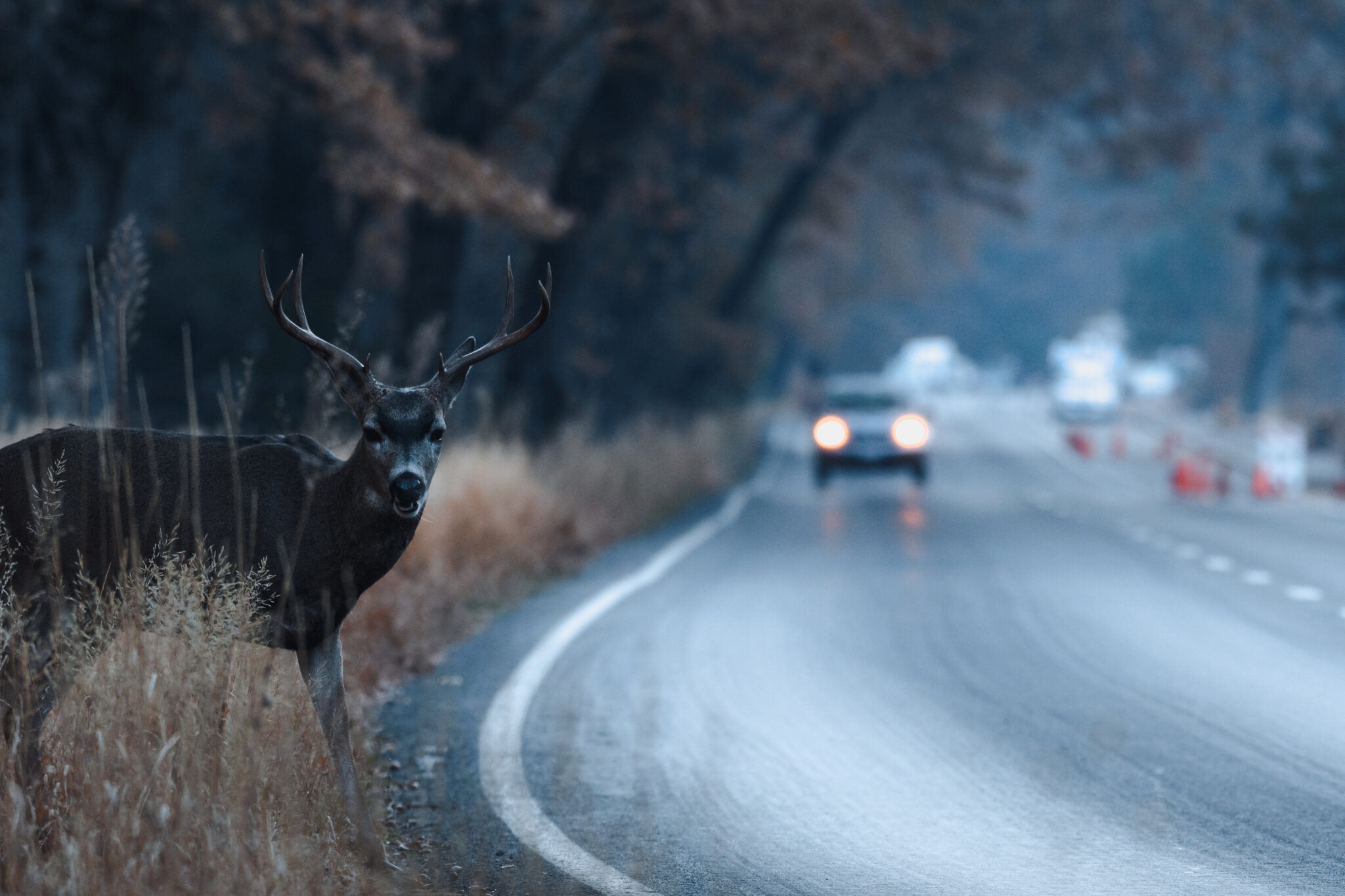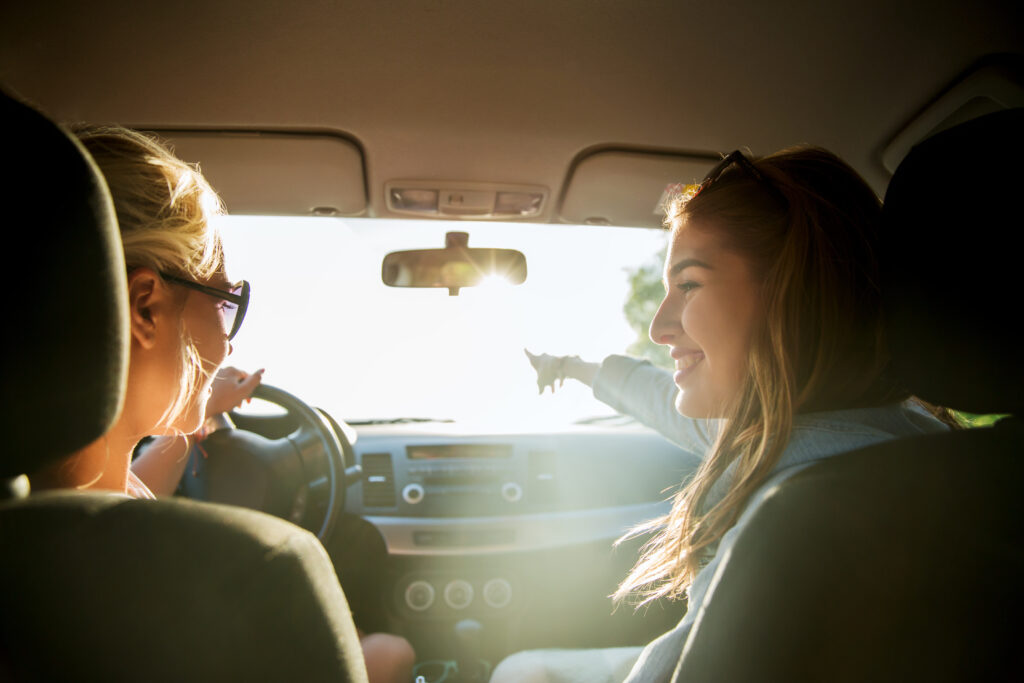I just hit a deer, now what? This is a question asked by about 2 million US drivers every year, according to the Insurance Information Institute (III). A deer-involved accident with your car can be scary, but it’s not the end of the world. It’s extremely hard to avoid hitting an animal in the road and it happens to even the best drivers.
Many thoughts will likely rush into your head after a deer-related accident, including injuries, damages to your car, and how it all could affect your insurance. The best thing you can do is stay calm. If you’ve just hit a deer or other animal, stop everything and follow these steps:
1. Move your car to safety
Get yourself and your car off the road to a safe place when the road is clear of oncoming traffic. If nothing else, move to the side of the road. This will ensure that you’re not blocking traffic. You should stay in your vehicle unless you know that it’s safe to go outside. It’s also a good idea to turn on your hazard lights to alert other drivers that something has happened.
Once out of the road, check for damages to your car and injuries of those involved. Be sure not to leave the scene of the accident, even if you’re not hurt and your car can still drive. You’ll need to be there to work with the authorities and collect useful info about the collision.
2. Alert the police or emergency services
Always call the police if you’ve just had a collision with a deer. You might have to do this for several reasons. The first is that the wounded animal is likely to endanger other drivers if it’s lying injured in the middle of the road, especially if it’s dark out. The police will take care of the animal and ensure the road is safe for other drivers. It’s also crucial to call 911 if you or someone else has been injured and needs immediate medical attention.
You’ll also need to call the police if there’s any property damage on the scene. State Farm notes that you may even have to fill out a police report if any damage occurred in the accident.
3. Document the accident
Document the scene if you hit a deer and injuries or property damage occurs. This involves collecting photos of the scene, documents from other drivers, and witness accounts and contact information. Try using your smartphone to take pictures and notes of the scene.
Below is key info to document after hitting an animal with your car:
- Accounts of the incident from any witnesses
- Pictures or accounts of injuries to yourself, passengers, or other drivers
- Pictures of the road, damages to your car, and the animal
- Make and model of your car and any other cars involved
- Documents from any other drivers involved, including insurance info and car registration
- Location of the collision
- Time of day and the weather
While collecting all the above info is ideal, do your best to get as much as possible. Even just some of it could help you fill out a report or file an insurance claim. Keep in mind that the police will ask you to complete a report if someone gets injured. Detailed notes and accounts of the collision will work in your favor with both the police and your car insurance company.
4. Keep away from the deer
A wounded deer or injured wild animal can be dangerous. Don’t try to go near it and help it after an accident. Scared animals can kick you with their strong legs or hurt you with their horns or antlers. It’s best to allow the police to take care of the animal after an incident.
5. Make sure your car is safe to drive
Your vehicle might not be safe to drive after a deer collision. Carefully check your car for severe damages after an accident. Try looking for hazardous signs such as:
- Damaged tires
- Broken lights
- Leaking fluids
- A hood that won’t latch
- Loose/detached parts
Hitting a deer could do just as much damage as any other accident. Call a tow truck or roadside help if you don’t think your car can drive.
6. Contact your insurance provider
Make sure your insurer knows about the accident as soon as possible. You’ll be able to start the claim process and get your car the repairs it needs once you call your auto insurance provider.
Coverage For Hitting a Deer
Only drivers with comprehensive insurance on their auto policy will be able to file a claim for hitting a deer or other animal. This is an optional yet essential coverage that protects you from incidents beyond your control. A partial list of these events include:
- Natural disasters
- Falling objects
- Theft
- Vandalism
- Hitting a wild animal
An animal must directly contact and damage your car for comprehensive coverage to kick in. The most common example is hitting an animal with your car. However, a deer or other animal could also run into your vehicle and cause damages. This could happen both while you’re parked or driving.
If an animal causes you to swerve and crash into another car or object, you won’t be able to use your comprehensive insurance. In this case, you’ll need collision to repair your vehicle. If you only have minimum the state requires and hit another car, your liability pays to fix their car. Your car can’t get repairs unless you have collision on your policy.
For animal-related collisions, you’ll need:
- Comprehensive insurance for direct contact and damage by a deer or other animal
- Collision insurance if a deer or other animal causes you to veer away and hit another car or object
Consider fully insuring your car if you live in a densely forested area with lots of deer and other large animals. Even the most skilled drivers will have trouble if a deer jumps in front of them at 60 mph.
Am I At Fault If I Hit a Deer?
Most of the time, you shouldn’t be at fault if you hit a deer with your car. This is because hitting one is random and tough to avoid. There’s often nothing you can do when you suddenly see an animal standing in the road other than hit it. It’d be more dangerous to swerve out of the way because you risk crashing into other cars or trees, which could cause more injury.
Will My Rates Go Up If I Hit a Deer?
Since running into a deer is a not-at-fault accident, your premium is unlikely to increase if it happens to you. Insurers also keep track of claim history and will raise your rates if you file many claims in a short time, per the National Association of Insurance Commissioners. Keep in mind that each provider has different practices and that many factors go into price increases.
Should I File a Claim If I Hit a Deer?
There are some situations where you don’t need to file a claim for hitting a deer, largely depending on the damages and your deductible. For example, it wouldn’t be worth filing a claim if you have a $1,000 deductible, but the repair costs are under $1,000. You’d be paying for the repairs out of pocket if you filed a claim in this case. This is because insurance companies only pay for damages that cost more than your deductible.
Frequently Asked Questions
Does hitting a deer go on your driving record?
No, hitting a deer is unlikely to appear on your driving record. These incidents are considered an act of god, which are covered by your comprehensive coverage. However, if the crash involves another vehicle, a violation of traffic laws, or you’re found to be at-fault, then it’s possible that the crash might go on your driver history.
By the same token, you also won’t get any points on your driving record for hitting a deer on the road. Even so, state laws vary. Check with your Department of Motor Vehicles to confirm how your local jurisdiction handles animal crashes and whether they go on your driver history.
Do you have to file a police report if you hit a deer?
You may have to file an accident report after hitting a deer. This is especially true if there was any property damage or injuries. The best thing you can do is work with the police and follow their instructions after the accident.
Does hitting a deer make your premium go up?
In general, hitting a deer won’t increase your insurance premium. This is because comprehensive claims don’t usually raise rates, as they relate to events out of your control. Even so, if an investigation show that you caused the accident and were at-fault, your collision coverage would be used and your rates could very well increase.
Are injuries covered if I hit an animal?
If you have them, personal injury protection (PIP) and medical payments (MedPay) insurance coverage would pay for any injuries you sustain after hitting a deer. Having either PIP or MedPay can help you pay for various hospital or emergency room expenses, lost wages, and more after an animal-related accident.
Does liability insurance cover hitting a deer?
No, liability coverage won’t cover the damages to your car after a collision with a deer or other animal. It only covers damages you cause to other drivers and property. You’ll need comprehensive coverage on your policy if you want to file a claim after hitting an animal. If you only have liability on your policy, you’re responsible for any costs related to the accident.


